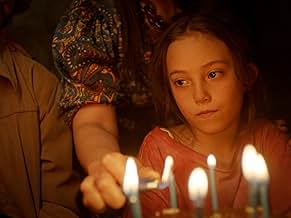AVALIAÇÃO DA IMDb
7,0/10
3,9 mil
SUA AVALIAÇÃO
Sol, de sete anos, passa o dia na casa do avô, ajudando nos preparativos de uma festa surpresa para o pai. Ao longo do dia, o caos toma conta aos poucos, destruindo os alicerces da família.Sol, de sete anos, passa o dia na casa do avô, ajudando nos preparativos de uma festa surpresa para o pai. Ao longo do dia, o caos toma conta aos poucos, destruindo os alicerces da família.Sol, de sete anos, passa o dia na casa do avô, ajudando nos preparativos de uma festa surpresa para o pai. Ao longo do dia, o caos toma conta aos poucos, destruindo os alicerces da família.
- Prêmios
- 24 vitórias e 40 indicações no total
Mateo Garcia
- Tonatiuh
- (as Mateo García Elizondo)
Teresa Sánchez
- Cruz
- (as Teresita Sánchez)
Lukas Urquijo López
- Chavita
- (as Lukas Urquijo)
José Manuel Poncelis
- Tío Octavio
- (as Manuel Poncelis)
Avaliações em destaque
I'm not usually fan of children in films, but boy - Naíma Sentíes' performance here as the young "Sol" is terrific. She, replete with multicoloured curly wig is with her mother preparing for a party to celebrate her father's birthday. What we learn from very early on is that her dad "Tona" (Mateo Garcia) is very unwell. Indeed, from the brief scene we see of him in the shower - this is a twenty-seven year old not destined to survive much longer. Clearly that information is known amongst the man's family and friends with his sisters, and his father, taking quite distinctly differing approaches to dealing with their impeding loss. The story takes it's time, but it's never dull. The observational nature of the drama, and the hugely charismatic effort from the young Sentíes is enthralling to watch as their day continues revealing stresses, strops, strains and a slightly defiant degree of optimism. As ensemble performances go, Marisol Gasé, Montserrat Marañon and Teresa Sánchez ensure that this well cast and presented story of a family in distress works evocatively. There are few tantrums, just a stoicism and dignity that makes this really quite a poignant story of a young girl - and a family - that doesn't quite appreciate that life is soon to change for ever.
Subtle but thoughtful family drama in which acclaimed director Lila Áviles accurately reflects the different nuances of each character and shows the different ways in which each of them faces an imminent tragedy within the family nucleus.
Lila develops the plot in an almost poetic way with visually attractive but meaningful shots that represent the interaction between the characters.
The young and promising actress Naíma Sentíes offers a spectacular performance in which she manages to communicate through her gaze and few dialogues the endless emotions that a child can't fully process in such a complex situation.
Warm and emotional, Tótem is a film that stands out from the average Mexican production in terms of substance and form.
Lila develops the plot in an almost poetic way with visually attractive but meaningful shots that represent the interaction between the characters.
The young and promising actress Naíma Sentíes offers a spectacular performance in which she manages to communicate through her gaze and few dialogues the endless emotions that a child can't fully process in such a complex situation.
Warm and emotional, Tótem is a film that stands out from the average Mexican production in terms of substance and form.
"Totem" (2023) is a poignant exploration of Mexican family dynamics, touching on themes that will resonate deeply with many Latin Americans. Directed by Lila Avilés, this film dives into the intricate web of familial relationships, showcasing the beauty and melancholy intertwined with life and death.
The narrative centers around the everyday interactions of a family, capturing the authenticity and warmth of Mexican culture. The film's strength lies in its ability to portray the universal yet unique experiences of Latin American families. The portrayal of shared meals, heartfelt conversations, and the silent understanding between family members are all depicted with a genuine touch that feels both intimate and relatable.
Avilés' personal connection to the story is evident, and the heartbreak woven into the narrative feels profoundly real. There is a beautiful, but also rather placid, sadness at the core of this film. It offers a reflective look at the beauty of death and the sorrow of life, making it a meditative experience.
However, the film's contemplative pace and subdued tone might not appeal to everyone. While the emotional depth is palpable, the narrative can feel a bit too stagnant at times. The pacing might be considered slow for viewers looking for more dynamic storytelling or dramatic twists.
The narrative centers around the everyday interactions of a family, capturing the authenticity and warmth of Mexican culture. The film's strength lies in its ability to portray the universal yet unique experiences of Latin American families. The portrayal of shared meals, heartfelt conversations, and the silent understanding between family members are all depicted with a genuine touch that feels both intimate and relatable.
Avilés' personal connection to the story is evident, and the heartbreak woven into the narrative feels profoundly real. There is a beautiful, but also rather placid, sadness at the core of this film. It offers a reflective look at the beauty of death and the sorrow of life, making it a meditative experience.
However, the film's contemplative pace and subdued tone might not appeal to everyone. While the emotional depth is palpable, the narrative can feel a bit too stagnant at times. The pacing might be considered slow for viewers looking for more dynamic storytelling or dramatic twists.
10EdgarST
Among the 10 best films I saw in 2023, four are about little girls who, in their childhood and growth, confront situations that transcend their daily activities, due to the strength or charm of the events. In the medium-length film «Le pupille» by the Italian director Alice Rohrwacher, the events that the girls experience during Christmas, in the middle of World War II, are closer to play and rebellion; but in «Alma viva» by the Portuguese cineaste Cristèle Alves Meira, «Brujería» by the Chilean filmmaker Christopher Murray and now in «Tótem» by Mexican director Lila Avilés, three girls must face powerful situations that affect their family stability.
«Tótem» revolves around the birthday party of Tonatiuh (played by screenwriter Mateo García Elizondo), a 27-year-old painter who is dying of cancer. This celebration will mark the life of his daughter, little Sol (Naima Sentíes), who, in the morning, arrives at the house of her psychologist grandfather (and father of Tonatiuh or Tona), where the party will be held. However, staying at her father's house is not a pleasant experience. The residents include two aunts who are mothers and do not seem to have a partner of any gender; three cousins and the woman who takes care of Tona. Among the eight residents there is a dynamic that makes the family dysfunction very evident, and Tona's illness seems more like a consequence of this toxic coexistence.
There is no mention of why Sol and her mother do not live with them, even though they both adore Tona, who is dying out, getting thinner, weaker and more suffering, and who will need extra strength and effort to be present at the party. During the morning, a spiritualist (who carries out a spiritual cleansing of the house, through rituals and incense) and a client of the grandfather also arrive: both women contribute to creating our impression of emotional imbalance. The house (no misogynistic allusion on my part) is like a matriarchal cage, where the men seem almost mutilated: the grandfather has lost the voice and Tona is dying. And I feel this impression because of the strength of the three main female characters in the house, compared to grandfather and Tona, who seem like byproducts of this family unit.
The excellence of Liles' direction and script, Diego Tenorio's cinematography, and of the performances by all cast members, combine to bringing this family to life on a crucial day in their lives and creating an exceptional film.
«Tótem» revolves around the birthday party of Tonatiuh (played by screenwriter Mateo García Elizondo), a 27-year-old painter who is dying of cancer. This celebration will mark the life of his daughter, little Sol (Naima Sentíes), who, in the morning, arrives at the house of her psychologist grandfather (and father of Tonatiuh or Tona), where the party will be held. However, staying at her father's house is not a pleasant experience. The residents include two aunts who are mothers and do not seem to have a partner of any gender; three cousins and the woman who takes care of Tona. Among the eight residents there is a dynamic that makes the family dysfunction very evident, and Tona's illness seems more like a consequence of this toxic coexistence.
There is no mention of why Sol and her mother do not live with them, even though they both adore Tona, who is dying out, getting thinner, weaker and more suffering, and who will need extra strength and effort to be present at the party. During the morning, a spiritualist (who carries out a spiritual cleansing of the house, through rituals and incense) and a client of the grandfather also arrive: both women contribute to creating our impression of emotional imbalance. The house (no misogynistic allusion on my part) is like a matriarchal cage, where the men seem almost mutilated: the grandfather has lost the voice and Tona is dying. And I feel this impression because of the strength of the three main female characters in the house, compared to grandfather and Tona, who seem like byproducts of this family unit.
The excellence of Liles' direction and script, Diego Tenorio's cinematography, and of the performances by all cast members, combine to bringing this family to life on a crucial day in their lives and creating an exceptional film.
Tótem follows Sol, a seven-year-old girl, as she spends a day at her grandfather's house, where her family is making preparations for a surprise birthday party for Sol's father, Tona.
This movie could be described as a cinematic stream of consciousness since the family dynamics depict dysfunctionality seen in different ways in each character and how they manage with the fact that Tona has cancer and his deteriorated health make any future uncertain.
Tótem is efficient in saying without words. Communicating with images that speak louder than any dialogue could. This allows the development of the story to be smooth yet effective in an empathic and natural way.
This movie could be described as a cinematic stream of consciousness since the family dynamics depict dysfunctionality seen in different ways in each character and how they manage with the fact that Tona has cancer and his deteriorated health make any future uncertain.
Tótem is efficient in saying without words. Communicating with images that speak louder than any dialogue could. This allows the development of the story to be smooth yet effective in an empathic and natural way.
Você sabia?
- CuriosidadesOfficial submission of Mexico for the 'Best International Feature Film' category of the 96th Academy Awards in 2024.
- ConexõesReferenced in Radio Dolin: Oscars 2024: The Best Films from around the World (2023)
Principais escolhas
Faça login para avaliar e ver a lista de recomendações personalizadas
- How long is Totem?Fornecido pela Alexa
Detalhes
Bilheteria
- Faturamento bruto nos EUA e Canadá
- US$ 100.150
- Fim de semana de estreia nos EUA e Canadá
- US$ 10.360
- 28 de jan. de 2024
- Faturamento bruto mundial
- US$ 163.587
- Tempo de duração
- 1 h 35 min(95 min)
- Cor
- Mixagem de som
- Proporção
- 1.33 : 1
Contribua para esta página
Sugerir uma alteração ou adicionar conteúdo ausente

























